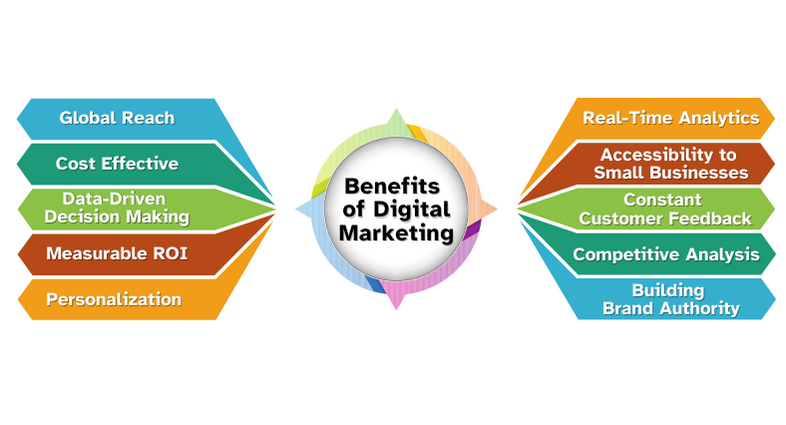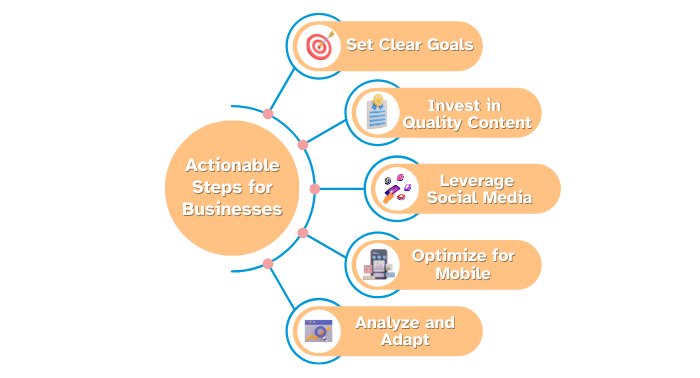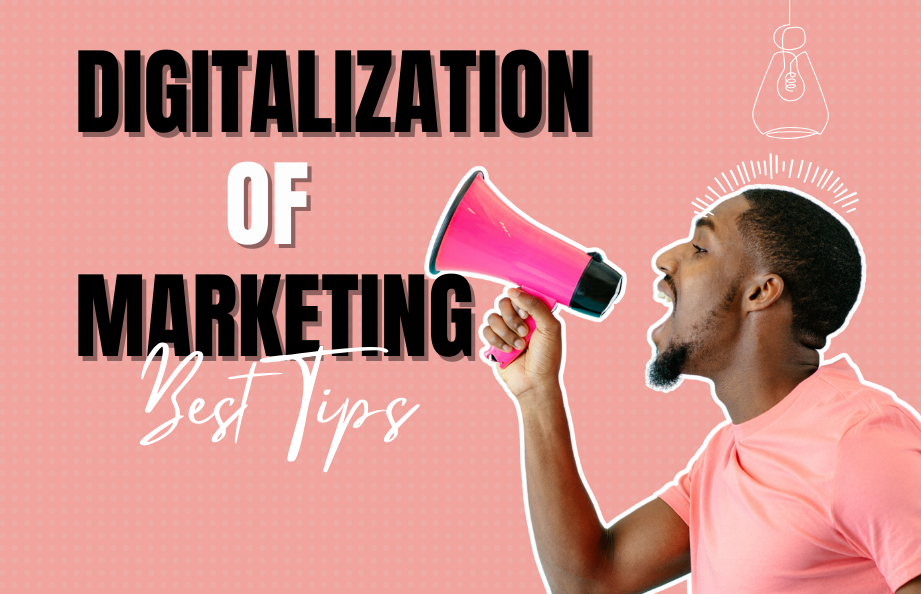Marketing has undergone a remarkable transformation in recent years with the advent of digitalization, reshaping the way businesses connect with their audiences. The digitalization of marketing has changed how businesses operate in many ways. Moreover, it is crucial to stay competitive in today’s digital world. Businesses that understand and use digital marketing are not just keeping up; they’re setting themselves up for success in the future.
“By 2025, it’s estimated that digital advertising will account for over 60% of total ad spending.” – Report by dintsu
What is Digitalization?
Digitalization is the process of using computers and technology to make things easier, faster, and more efficient by turning information and tasks into digital form, which can be easily managed and accessed online.
What is the Digitalization of Marketing?
The digitalization of marketing refers to the transformative shift in how businesses promote their products and connect with their audience in the digital age. It’s all about using digital channels and tools to reach and engage with customers. This means leveraging the internet, social media platforms, email, search engines, and various digital technologies to create, deliver, and optimize marketing campaigns.
It’s not just about advertising online; it’s about data-driven strategies, personalized experiences, and real-time interactions. This digital evolution empowers marketers to be more agile, targeted, and responsive to customer needs, ultimately enhancing the effectiveness and efficiency of their marketing efforts.
The Shift to Digital Marketing
Gone are the days when traditional advertising channels like billboards, print ads, and TV commercials were the primary means of reaching potential customers. Businesses can now engage their target audience more effectively, due to the digital revolution. The fundamental force behind this development is the exponential rise in online users. According to Brightlocal, 98% of consumers read online reviews before visiting a business, emphasizing the impact of customer feedback on purchasing decisions.
The internet has developed into an epicentre for communication and information, making it an ideal opportunity for businesses to market their goods and services. Digital marketing presents an unmatched potential to reach a worldwide audience because there are billions of people online.
Role of Digital Marketing in Businesses

1. Global Reach
Digital marketing empowers businesses to overcome geographical limitations. When implementing a carefully planned digital marketing strategy, businesses can connect with potential customers from all over the world.
2. Cost Effective
In contrast to traditional marketing methods, digital marketing is cost-effective. To enhance return on investment (ROI), businesses can allocate their budget with greater precision and continuously track the real-time effectiveness of their endeavours.
3. Data-Driven Decision Making
Digital marketing unlocks a wealth of invaluable data and empowers businesses through a comprehensive suite of advanced analytics tools. Marketers can gather insights into customer behaviour, preferences, and engagement, allowing for informed decisions and tailored strategies accordingly.
4. Personalization
Highly customized campaigns are possible with digital marketing. Based on demographics, behaviour, or interests, businesses can divide their audience into different segments and present each section with information and offers that appeal to them.
5. Measurable ROI
Digital marketing provides the ability to measure return on investment (ROI) accurately. Marketers can attribute conversions and track the journey of each customer from their initial interaction to the final purchase. This visibility into ROI allows businesses to allocate resources wisely and focus on strategies that deliver the best results.
6. Real-Time Analytics
Digital marketing offers a wealth of data and analytics tools that empower businesses to make data-driven decisions. Real-time campaign assessment empowers marketers to evaluate performance through the lens of critical metrics, including website traffic, conversion rates, click-through rates, and various other key performance indicators. This data enables rapid adjustments and optimizations to improve campaign outcomes.
7. Accessibility to Small Businesses
Digital marketing equalizes opportunities for businesses, irrespective of their scale or financial resources. Smaller enterprises can effectively challenge their larger counterparts by employing digital marketing tools strategically. With a well-crafted website, engaging social media presence, and effective SEO strategies, small businesses can establish their brand and reach a global audience without the need for exorbitant marketing budgets.
8. Constant Customer Feedback
Digital marketing enables businesses to receive instant feedback from customers. Through social media comments, reviews, and direct messages, companies can gain valuable insights into customer preferences and concerns. This real-time feedback loop allows for quick adjustments and improvements, strengthening customer satisfaction and loyalty.
9. Competitive Analysis
Digital marketing tools provide businesses with the ability to monitor their competitors closely. Through competitor analysis, companies can gain insights into the strategies and tactics that work in their industry. This knowledge allows businesses to refine their own digital marketing strategies, evolve with shifting market trends, and maintain a competitive edge.
10. Building Brand Authority
Through consistent and strategic digital marketing efforts, Companies can position themselves as experts within their specific industries. Thought leadership content, industry insights, and a strong online presence contribute to brand authority. When a brand is perceived as knowledgeable and dependable by customers, their likelihood of choosing it over competitors increases.
Steps Businesses Can Take for Digitalization of Marketing

1. Set Clear Goals
Define marketing objectives and what the business hopes to achieve with digital marketing. Whether it’s increased website traffic, lead generation, or sales, clear goals will guide the strategy.
2. Invest in Quality Content
In the digital age, content rules. Produce material that informs, amuses, keeps the audience interested and solves their problems. Consistent blogging, videos, infographics, and social media posts can establish your brand’s authority. You can say that consistency is the key to content creation.
3. Leverage Social Media
Determine which social media channels are most suitable for your specific audience. Establish a strong online presence, share valuable content, and engage actively with followers.
4. Optimize for Mobile
Because a significant portion of internet users access content via mobile devices, it’s crucial to ensure that websites and digital content adapt seamlessly to mobile screens. With the rise of mobile device usage, your website and content must be mobile-friendly. Ensure that your website loads quickly on mobile devices and that your emails and content display well on smaller screens.
5. Analyze and Adapt
Regularly review the performance of digital marketing efforts. Use analytics tools to track key metrics and adjust the strategy based on data-driven insights.
The way that businesses interact with their audience has changed as a result of the digitalization of marketing. Companies can succeed in this constantly changing environment by embracing digital marketing methods and keeping up with the most recent trends and technologies. Never forget that delivering value, cultivating relationships, and remaining adaptable in the face of change are the keys to success in digital marketing.
More Advanced Strategies for Digitalization Of Marketing
Above, we’ve outlined some initial steps to begin your digitalization journey, but to truly delve deeper into the digital revolution, it’s crucial to embrace these advanced strategies that will propel your marketing efforts forward.
1. Data-Driven Decision Making
The foundation of successful digital marketing is data. Start by collecting and analyzing customer data to gain valuable insights into their behaviour and preferences. Use this data to tailor your marketing campaigns, personalize content, and make informed decisions that resonate with your target audience.
2. Social Media Mastery:
Leverage the power of social media platforms to connect with your audience directly. Craft a strong social media strategy that includes regular posting, engagement with followers, and paid advertising campaigns to increase brand awareness and drive conversions.
3. Search Engine Optimization (SEO):
Optimize your website for search engines to ensure your content ranks well in search results. Conduct keyword research, optimize meta tags, and improve site speed to boost organic traffic. A well-executed SEO strategy can significantly impact your online visibility.
4. Email Marketing Automation:
Implement email marketing automation to nurture leads and build lasting customer relationships. Create personalized email campaigns triggered by user behaviour, such as abandoned carts or website visits. Automation saves time and ensures timely communication with your audience.
5. Influencer Partnerships:
Collaborate with influencers in your industry to expand your reach and credibility. Influencers can help you connect with their engaged followers, providing authentic endorsements of your products or services.
6. Analytics and Testing:
Continuously monitor the performance of your digital marketing efforts. Use tools like Google Analytics to track website traffic and user behaviour. Conduct A/B tests on different elements of your campaigns to optimize for better results.
7. Customer Relationship Management (CRM):
Implement a CRM system to streamline customer interactions, manage leads, and personalize marketing efforts. CRM tools help you maintain a database of customer information, allowing for more targeted and effective communication.
8. Adaptability and Innovation:
Digitalization has opened up vast opportunities for businesses to connect with their audiences in more meaningful ways. By implementing these proven strategies, you can transform your marketing efforts, drive growth, and ensure long-term success in the digital age. Stay agile, data-driven, and customer-centric to thrive in this dynamic landscape.
Conclusion: Impact of Digitalization of Marketing
In conclusion, the digitalization of marketing is no longer an option but a necessity in today’s fast-paced business landscape. As we’ve explored, these strategies are proven to drive results and ensure your marketing efforts remain competitive and effective. Let’s wrap up with a glance at some compelling figures that highlight the impact of digitalization:
- Increased ROI: Companies that have effectively implemented digital marketing strategies report an average of 2.8 times better revenue growth expectancy (Source: HubSpot).
- Conversion Boost: Personalized emails, a crucial aspect of digital marketing, can deliver six times higher transaction rates (Source: Experian).
- Mobile Matters: With mobile optimization, businesses can witness up to a 5% increase in mobile conversion rates (Source: Adobe).
- SEO Success: Websites on the first page of Google search results capture 71% of clicks, emphasizing the importance of SEO (Source: Moz).
- Social Influence: Over 90% of marketers acknowledge that social media significantly increased their brand exposure (Source: Social Media Examiner).
These figures underscore the immense potential digitalization holds for your marketing efforts. By harnessing data-driven decisions, embracing content excellence, and leveraging the power of social media and SEO, you can not only navigate but excel in the digital revolution.
Remember, digitalization is an ongoing journey. Continuously adapting to new trends and technologies will keep your marketing strategies fresh and relevant. As you embrace these advanced strategies and harness the transformative power of digitalization, your business is poised to thrive in the ever-evolving digital marketing landscape. Stay agile, stay innovative, and stay ahead of the curve to achieve enduring success.



